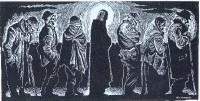| |
Why This Issue
“So, does anyone know who Peter Maurin is?” A long, long silence ensued. I was speaking to a group of high school students; they had read a bit about the Catholic Worker, seen Entertaining Angels: The Dorothy Day Story, and fuzzily remembered who Dorothy Day was after we clarified that I wasn’t asking about Doris Day, the actress. This response is not unusual in groups; many people recognize Dorothy Day’s name but few people outside of the Catholic Worker movement know of Peter Maurin, the French immigrant who provided the impetus, backbone and underpinning of the Catholic Worker
movement.
Our community is thrilled to present this issue on Peter Maurin. It seems that we, along with Workers and friends across the country, are considering Peter’s philosophies with renewed appreciati on, and what a gift they are! Certainly, society’s problems - environmental ruin, corporate omnipotence, and disconnecti on from the land, to name a few - make Peter Maurin’s vision look “less like a medieval utopian fantasy and more like an urgent and rati onal plan for a new and sustainable social order,” in the words of RT author Brian Terrell. We hope you’ll join us at a Potluck and RoundTable Discussion on Peter Maurin – Saturday, May 1st (the 77th Anniversary of the Catholic Worker!) at Karen House! Details are on the back page.
When most people think “Catholic Worker,” they automatically think “house of hospitality.” Here’s the exciting news: we are a diversifying movement, with increasing numbers of communities doing craft work, resistance work, farm work, and education work, joining communities doing the vital works of mercy in urban centers. These communities together embody essential pieces of a personalist society, geared towards the dignity of the human person, organized in local communities,
and connected to land.
How does one summarize the vast teachings of Peter Maurin? We tasked Carolyn Griffeth with the near-impossible mission: distill the sum of Peter’s theology and philosophy into a mere 2,200 words. In it, we witness a faith-filled life based on nonviolence, the works of mercy, manual labor, and voluntary poverty, ideals that are both counter-cultural and absurdly commonsensical. Later, Teka Childress provides a context for Peter to speak for himself in her article highlighting Peter’s
Easy Essays.
Peter, whose pre-Catholic Worker life is described wonderfully in Ellen Rehg’s article, recognized that many of our urban problems, our conflicts with other nati ons, and our oppression of other people, are rooted in issues of land and resources. From his home of 20+ years at Strangers and Guests Catholic Worker Farm, Brian Terrell discusses this idea while chronicling Peter’s vision throughout the 77 year history of the Catholic Worker.
The Catholic Worker promotes structures that emphasize human dignity – from how we organize ourselves (we model and promote personalist, consensus-based, small communities) to how we organize our money (check out our last RoundTable on the economic model of Distributism). Along these lines, Eric Anglada from New Hope Catholic Worker Farm discusses Peter Maurin’s vision of, and their community’s experiments in, the Agronomic University. This is a developing
concept of educati on as a structure that promotes human dignity.
In this issue, we also hear the news from both Karen and Kabat House, while in Catholic Worker Thought and Action, Colleen Kelly discusses Peter Maurin’s vision of anarchism, which is rooted in the idea of “individual freedom, personal responsibility, and loving each person in the broadest sense.”
Because of the meeting between this 50 year-old, undocumented, hobo-looking laborer and a 33 year-old single mother who was working precariously as a freelance writer and living with her sister, we are here today. It’s both mindboggling and incredibly hopeful. And so, for those who can tell you about Dorothy Day, but look befuddled at the mention of our most-inspiring Frenchman; and for ourselves, who extol the virtues of Dorothy while being befuddled ourselves at Peter’s expansive vision, we offer these humble reflections. Ladies and gentlemen, Peter Maurin.
- Jenny Truax |
|


